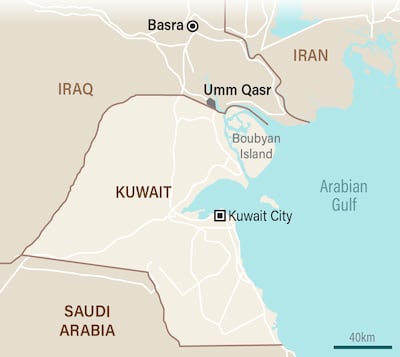Baghdad on Wednesday denied it was handing over land to Kuwait after a public outcry over the end of a decades-old demarcation agreement on the border near Iraq's vital Umm Qasr port.
The land border was demarcated under a UN resolution in 1993, three years after Iraq's invasion of Kuwait was pushed back, and granted Kuwait some territory that had previously been held by Baghdad.
The maritime border near Umm Qasr, Iraq’s only deepwater port that handles 70 per cent of the country's trade, was left for the two sides to resolve.
Iraq and Kuwait confirmed on Sunday that they would work towards a final border deal including the waters off Umm Qasr port. Details of what that meant were not disclosed, resulting in the public outcry.
“The land border demarcation with the Kuwaiti side came in accordance with [UN Security Council] Resolution 833, and we confirm that the Iraqi government shows its full commitment and fulfilment for international obligations,” Ahmed Al Sahaf, spokesman for the Iraqi Foreign Ministry, told The National.
“The land borders have not and will not be addressed by any changes since they were officially installed.”
The two countries agreed nearly a decade ago to create a 500-metre no-man's-land on each side of the border and to move Iraqi farmers in the area to new homes. The agreement stipulated that Kuwait would build the homes.
“The houses are now complete,” Farhad Alaadin, foreign affairs adviser to Iraqi Prime Minister Mohammed Al Sudani, told The National.
Kuwaiti Foreign Minister Sheikh Salem Abdullah Al Sabah requested the “formal handover to the Iraqi side” during his visit to Baghdad on Sunday.
The next step will ensure that “it will be distributed to those households that lost their houses due to the construction of the road and border lines”, Mr Alaadin said.
Mr Alaadin said “no Iraqi land will be handed over and all that is taking place is the implementation of what was agreed over the years between the two governments prior and after 2003".

“Security Council Resolution 833 determines the border lines between Iraq and Kuwait, for its implementation, both sides have agreed over several years to plan out the border lines,” he said.
The port of Umm Qasr sits at the top of the strategic Gulf waterways. Imports handled there usually include grain shipments and heavy equipment used in the energy industry.
Baghdad insists that the maritime border delineation should provide it unhindered access to Gulf waters, a lifeline for its economy and oil exports.
Sheikh Salem held talks with his Iraqi counterpart Fuad Hussein on Sunday said there was “complete consensus” between Kuwait and Iraq to “resolve outstanding problems between the two countries, particularly the demarcation of maritime boundaries”.
Iraqi government spokesman, Basem Al Awadi, said the issue had been turned into “political blackmail by different political blocs spreading rumours and accusations to insult all previous governments”.
Mazin Al Eshaiker, an independent Iraqi politician and economist, told The National that the actual agreement between the two sides has not been disclosed and that parliament must ratify the final deal.
“Whatever the outcome of their negotiations is, it must be ratified by the Iraqi parliament in order to have full transparency as to what exactly they agreed to,” Mr Al Eshaiker said.
He said the issue was discussed between the Foreign Minister and Basra Governor Assad Al Eidani.
“Members of the negotiating team lack the technical know-how to discuss this issue, as the ones who are indeed knowledgeable were sidelined,” he said.
“So the Foreign Minister and the governor of Basra led the discussion.
“This shows how weak the government is.”
Local response
The issue has sparked protests and angered Iraqis across the country.
Ahmed Jallab, who lives in Umm Qasr, told The National that he refused to leave his home and land regardless of what the government planned to do.
“I was raised and born in Umm Qasr and I will never leave my land even if they killed me – I live here and will die here,” Mr Jallab said.
The 40-year-old said he would not accept the government’s offer of new homes to residents of the area.
“I will not accept this offer, this land is like a mother to all of us and it is impossible to leave my mother this way,” he said. Mr Jallab added that he has close attachments to the area.
“It is a political game and a bargain to sell our lands to Kuwait but we will never let anyone replace our identity,” he said.
Basra resident Khaldoun Al Jazaery, 29, said the high amounts of corruption found in local and central administrations has put the Iraqi government in a weak position.
“The Iraqi government is in a weak spot and they will not lift a finger because most of the decision-makers in the country are disloyal and corrupt,” he said.
But he said the actions of the government would never break the will of the Iraqi people.
“Iraqi people can never be underestimated, and the pressures that will be generated will force the Iraqi government to move and confront this transgression of our land,” he said.
Additional reporting by Azhar Al Rubaie from Basra


